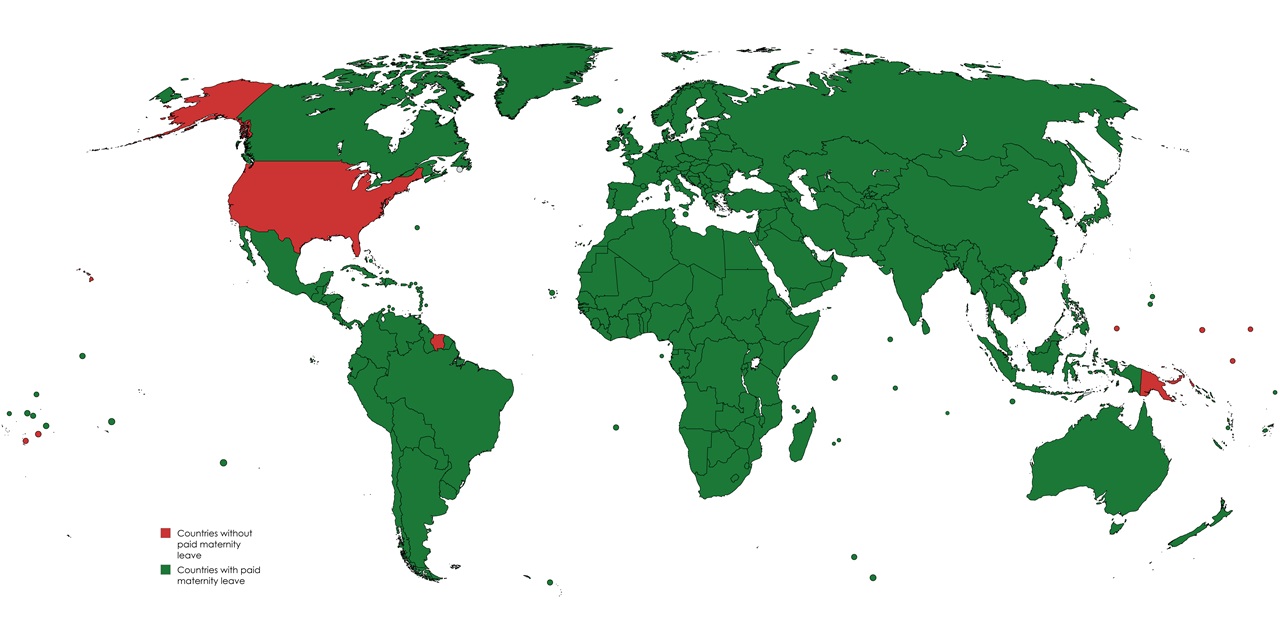There are 195 countries (depending on your definition of a country) in the world with 195 different sets of federal-level laws. Of those, only 9 countries do not guarantee paid parental leave for either the mother or father of a newborn.

The U.S. is one of those nine and there is no current legislation going through Congress which would change that fact.
The other eight countries – Suriname, Papau New Guinea, Micronesia, Nauru, Tonga, Palau and the Marshall Islands – have a collective economy approximately 20% smaller than Vermont. When the U.S. has the world’s largest economy by a healthy margin, there isn’t much of an excuse for at least some sort of social support for new parents.
What kind of parental leave is there in the U.S.?
While many private companies do offer paid maternity/paternity leave, it is done more as an incentive to hire/keep employees rather than out of a sense of civic duty. It is not hard to imagine why an employee of child-bearing age wouldn’t choose Company A over Company B if A offers 9 weeks of paid parental leave.
In the U.S., the Family Medical Leave Act (FMLA) dictates that an employer must allow an employee to take up to 12 weeks off for the birth or adoption of a child. FMLA protects the employee’s job during that time and makes it illegal to retaliate specifically due to the leave. What FMLA does not protect is the employee’s salary, which an employer can stop paying, for the duration of the leave. This is something seen more in the service industry and what would be considered “starter” jobs. Most employers recognize the value of keeping trained employees who are competent at their jobs and responsible enough to follow their schedule.
Some companies have relatively generous (for the U.S.) parental leave policies. Google gives new mothers 6 months of paid leave, along with 18 weeks of paid leave for fathers or adoptive parents, with this time not requiring to be split if they both work for the company. Apple gives new mothers 16 weeks of paid leave, along with 6 weeks of paid leave for fathers. American Express and Netflix offer between 5-6 months of paid parental leave. It seems to be larger companies which offer more generous parental leave, though most do not compare to some of the leave policies of European nations.
Where are the best parental leave policies found?
The best leave policy for mothers can be found in Bulgaria as the country requires at least 45 days off of work, followed by another optional (to the mother) 375 days off at 90% pay. Norway also has a substantial leave policy with 59 weeks at 80% pay, though neither parent can take more than 44 weeks individually. Canada allows up to 18 months of leave, though only at 33% pay. In the U.S, there are laws in some states which set a minimum for paid parental leave. New York allows for 3 months at 67% of pay while Connecticut provides up to 16 weeks at a sliding pay scale.
What might a U.S. law mandating paid parental leave look like?
While there have been attempts in the last couple of years to enact some sort of national paid parental leave program, they have all failed mainly due to the cost associated with it. In the states with paid parental leave programs, there are employee contributions and (usually) employer contributions. For a national program to be fully funded to the tune of 12 weeks at 90% (assuming a median wage), it would take a total (employer+employee) contribution of about .085% of gross taxable wages. This is less than the 2.9% total contribution for Medicare and 12.4% combined for Social Security into which most employees pay.
This type of setup would benefit younger employees, who typically make less than individuals more established in their jobs. Most importantly, it would provide newborns and their parents a significant amount of time for bonding and self-care without pressure to return to work as soon as physically possible.
There aren’t any paid parental leave bills heading for Congress on the horizon. Progress will likely be made through state legislatures and those states will make themselves more attractive to prospective employees going forward.
